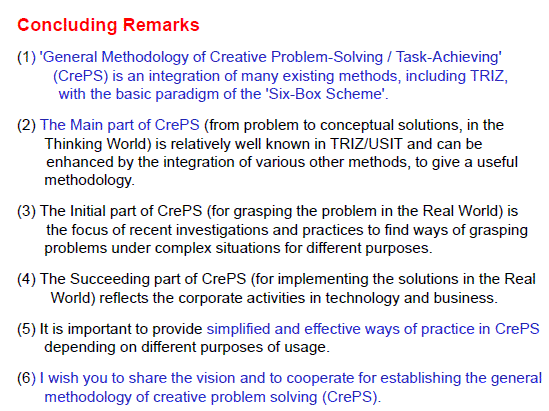Dear Darrell, Thank you for your message. Today I am back at home from Paris. I and many people missed you at TFC2013.
Thank you for your comments on my approach. It touches on an important point of discussion.
(1) According to the understanding of the 'Six-box Scheme',
Identifying the 'right' problem concerns essentially with the stage from Box-1 (User's specific problem) to Box-2 (Well defined user's specific problem) to be carried out in the 'Real World' (with the criteria in the Real World).
[In the Thinking World, the problem to be considered is checked and confirmed for a meaningful start of the problem solving process.]
Executing the generated ideas concerns with the stage from Box-5 (Conceptual solutions) to Box-6 (Executed solutions), to be carried out in the 'Real World' (by all the efforts of the industry).
Thus you are talking about the difficulties in the Real World.
-- I agree with you there are a lot of difficulties in these aspects.
(2) "The 'ideation'/problem solving part" you say may mostly correspond in my scheme to the stages from Box-2 to Box-3 to Box-4 to Box-5 to be carried out in the 'Thinking World'.
I understand when you say this part is 'the easiest part' for you.
But as you see there are a large variety of methods, discussions, publications, consulting firms, etc. which are often fragmental, partial, and fighting one another.
There is no consensus among the researchers/practitioners of these methods on the general structure which can integrate the relevant methods.
(3) Four-Box Scheme may be the main paradigm of problem solving so far. But it has serious pit falls.
- The analysis process for getting a general problem is partial and just finding some preset pattern in the knowledge bases.
- The general solution derived by the knowledge base is just a suggestion/hint. For obtaining an idea suitable for the problem, one needs some further thinking process.
- The Four-Box scheme does not clarify the differences between the Real World and the Thinking World. Thus it may assume that the problem finding and the solution execution processes are also included in the Four boxes. Such an assumption may confuse the discussion and make the problem solving methodology open-ended and hence vague and complex all the way.
(4) 'Six-Box Scheme' can be the new paradigm for the general theory of creative probelm solving. -- This is the main proposition of my new initiative.
The new scheme is quite natural and well accord with the general way of thinking in science. Clarify the problem and analyze it from several standard aspects, both in the present system and in the ideal system. Then various ideas will come out, sometimes by the help of some guidelines, for improving the system, and hence they should be constructed into conceptual solutions.
(5) Clarifying "the 'ideation'/problem solving part" and integrating so many different methods in a systematic manner will need so much efforts, leadership, and research.
This initiative needs many people who understand relevant methods and share the vision of integrating them.
(6) Nowadays 'Innovation' is the most fashionable keyword among industry leaders, politicians, etc. But basic methodologies for innovation are not clear.
There need to be three basic methodologies:
One for 'problem finding' (Box-1 to Box-2),
One for 'problem solving' (Box-2 to Box-5), and
One for 'solution execution' (Box-5 t Box-6).
When the 'problem solving' methodology is established well, the other two methodolgies will have good bases for further development.
(7) The following is my slide of 'Concluding Remarks' of my presentation at the TFC2013  . (Posted in my Web site on Oct. 25)
. (Posted in my Web site on Oct. 25)

Thanking you for your comment, I wish your undestanding and cooperation.
Best wishes, Toru Nakagawa
